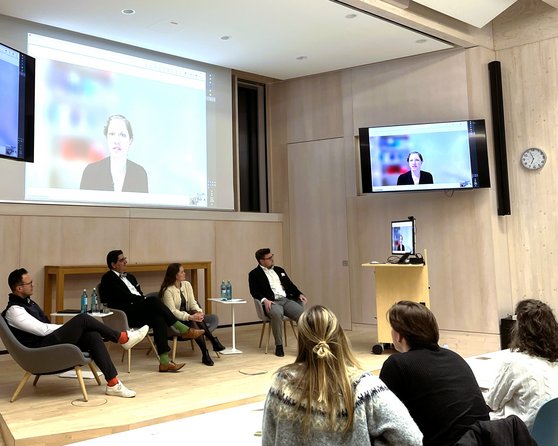
Legal Innovation Talk on ‘AI in Higher Education’
Experts discuss the future of studying, examinations and skills

How is artificial intelligence changing higher education – and what skills will students really need in the future? Experts from the fields of law and economics came together at EBS Universität's Legal Innovation Talk to discuss the role of AI in teaching. The event highlighted how profoundly digital technologies are already influencing learning, testing and academic self-image and how much scope universities have to shape the future.
The panel speakers were:
- Prof. Dr. Ann-Marie Kaulbach (European University Viadrina Frankfurt/Oder)
- Victoria Fricke, LL.M. (McGill) (trainee lawyer at the Higher Regional Court of Braunschweig; member of the Young Professional Board, German Legal Tech Hub)
- Prof. Dr. Tobias Gutmann (EBS Business School)
- Prof. Dr. Emanuel V. Towfigh (EBS Law School)
AI as a tool – but one that needs smart rules
The panel began by focusing on a fundamental question: What goals are universities actually pursuing at a time when students use AI as a matter of course? It is not just a matter of making exams ‘AI-proof’, but of rethinking the mission statement of academic education. Critical thinking, assessment skills and a deeper understanding of the underlying technologies were identified as key competencies that will continue to form the core of university education in the future.
There was agreement that AI should support humans, not replace them. Creative achievement, analytical thinking and professional judgement remain – according to the panel – genuinely human processes.
Changed learning culture: when AI raises the average
It became clear that AI is already shaping everyday student life. Students use chatbots to structure their research, prepare arguments or create learning materials. The effects are visible: texts and emails are better formulated and content is more clearly structured.
At the same time, the panellists warned against outsourcing learning processes to AI. Victoria Fricke put it succinctly: ‘We must not allow learning to be taken over.’ While AI facilitates access to information, it carries the risk of reducing the intensity of engagement with content.
Prof. Ann-Marie Kaulbach observes a counter-movement among students in this area of tension: a ‘longing for genuine legal discovery’ and the need to delve into technical questions themselves – an indication that young people want to use AI, but do not want to become dependent on it.
What exam formats exist – and which ones need to change?
There was intense discussion about how exams should be designed in the age of AI. The classic term paper was a particular focus. While Prof. Tobias Gutmann pointedly declared that the traditional form of the term paper was ‘dead,’ other panel participants emphasised its enduring value – albeit in a revised form.
Everyone agreed that exams will focus more on interaction, application and analytical work in the future. Oral exams, project-oriented work, practical case studies, presentations and formats in which students take a critical stance are gaining in importance. Challenge-based learning, in which real-life problems from companies are addressed, was also highlighted as a promising approach.
What these formats have in common is that they enable the reflective use of AI and ensure that students perform their own academic work and build methodological competence.
What skills students will need in the future
The discussion clearly showed that AI is not only changing how exams are conducted, but also which skills are becoming more important in higher education. In the future, universities will need to train students more intensively in critically evaluating AI-generated content, independently analysing complex interrelationships and reflecting on decisions in light of different value assumptions.
Particular focus was placed on the question of which normative standards are embedded in AI systems. Since many models are based on data and assumptions that originate outside Europe, it is the task of universities to sensitise students to these contexts and provide them with tools for reflective technological competence.
AI in jurisprudence: support or risk?
Possible scenarios for its use in the legal system were also discussed. Towfigh referred to international examples in which AI proposes court decisions and judges must justify any deviation from them. Such approaches could enable efficiency gains, but at the same time harbour normative risks – such as a creeping shift in responsibility.
A comment from the plenary session recalled the US postal scandal, in which a faulty system led to serious misjudgements. The discussion highlighted how sensitive the use of AI is in a constitutional state and how important clear guidelines and human control remain.
Outlook: scope for creativity at universities
The evening made it clear that AI has long been part of modern university teaching – the question is not whether universities should engage with it, but how. EBS Universität sees this development as an opportunity to further develop learning and examination formats, strengthen students' technological confidence and teach them responsible usage skills.
In keeping with the spirit of the Legal Innovation Talk, the university will continue this exchange – in dialogue with academia, practitioners and students who are actively shaping change.







